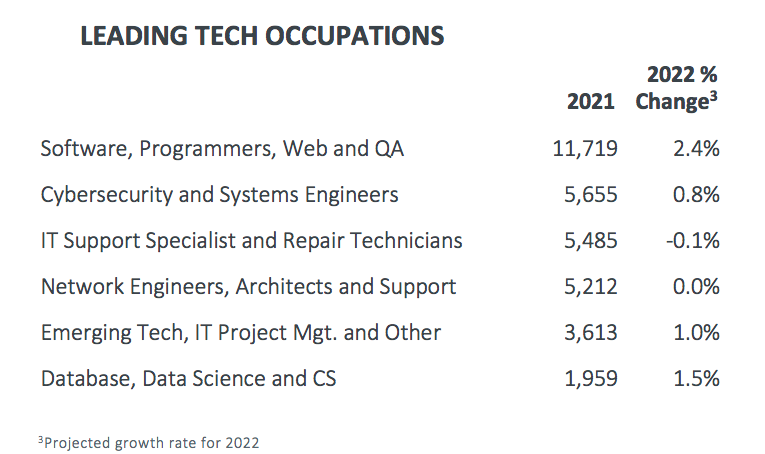Pittsburgh tech is on the rise, but not yet at pace with top tech markets.
According to new data from the Computing Technology Industry Association (CompTIA), Pittsburgh has a net tech employment of over 60,000. The news comes with the org’s release of its latest State of the Tech Workforce, which shares tech workforce data and analytics at the local, state and national level.
In total, this year’s report found that the tech industry is projected to be responsible for 8.9 million jobs in the US in 2022, with a total of 178,000 net new jobs. Part of that growth comes from a 5% year-over-year increase in the number of tech businesses in the country, now at a total of 507,000.
The money in the industry suggests that trend will only continue, with CompTIA finding that the median tech occupation wage is 125% higher than the median national wage in the US, and that the tech industry is increasingly a driver of the national economy, comprising $1.8 trillion worth of economic output, equivalent to 9% of the total U.S. economy. All of that contributes to a projected growth rate for the industry that’s nearly twice the expected national jobs rate.
Read the full reportPittsburgh plays no small role in that success. The local tech industry makes up for $12.2 billion in economic impact, mirroring national trends by accounting for around 8.5% of the total local economy. And with a total of 60,734 employees in tech occupations in 2021 (about 5.5% of the region’s total workforce), the city is the 29th largest metro in the United States for tech.
Similar trends have already been illustrated by other recent reports out of local organizations like Innovation Works, which pointed to a total $10.5 billion investment into the Pittsburgh tech sector over the past decade. And last fall, the Pittsburgh Technology Council released its own State of the Industry Report, which found that tech establishments in the 13 counties across southwestern Pennsylvania employ over 305,000 people, comprising almost 26% of the total regional workforce.
That investment and economic success has also increased wages for Pittsburgh technologists, who earn a median of $82,820 annually, per CompTIA — a number that’s 92% higher the median wage for the region. Driving that growth are the 11,719 software engineers and programmers in Pittsburgh’s tech economy, followed by 5,655 cybersecurity and systems engineers; those are expected to grow by 2.4% and 0.8% in 2022, respectively. Data science jobs are expected to grow for Pittsburgh this year, too, by about 1.5% according to CompTIA, despite that only about 2,000 people have occupations in that field right now.

Leading tech occupations for Pittsburgh. (Image via CompTIA report)
Those growth rates align with national ones expected for the tech industry over the next decade. Data science occupations have a projected growth rate of 268% over the national growth rate for overall employment, while cybersecurity occupations have a projected rate of 253%. Software developer roles aren’t far behind, with an expected growth rate of 215% over the next 10 years.
Despite Pittsburgh’s progress in growing a sustainable tech industry, it still struggles with representation in the workforce. While Black/African American residents make up 8% of all occupations in the region, they only comprise 5% of the tech workforce. Hispanic/Latino residents make up for 2% of the tech workforce despite representing around 3% of occupation in the total economy. Most alarming however, is the fact that despite women making up 49% of all occupations in the region, they only make up for 25% of occupations in Pittsburgh’s tech industry. (Note that these statistics are reflective of the Pittsburgh, PA MSA region, and not the City of Pittsburgh limits.)
There are signs that these setbacks could be hindering Pittsburgh’s growth compared to other emerging tech metros in the country. The city is only expected to grow its tech workforce by about 0.8% in 2022 — and it lost tech jobs last year, seeing a decrease of about 0.4% in 2021. From income data, too, it’s clear that those driving tech job and wage increases in Pittsburgh are typically white men. As many technologists and industry leaders have previously told Technical.ly, resolving that difference must be a key goal in the expansion of Pittsburgh’s tech economy.
Sophie Burkholder is a 2021-2022 corps member for Report for America, an initiative of The Groundtruth Project that pairs young journalists with local newsrooms. This position is supported by the Heinz Endowments.
This editorial article is a part of Cybersecurity Month of Technical.ly's 2022 editorial calendar.
Before you go...
To keep our site paywall-free, we’re launching a campaign to raise $25,000 by the end of the year. We believe information about entrepreneurs and tech should be accessible to everyone and your support helps make that happen, because journalism costs money.
Can we count on you? Your contribution to the Technical.ly Journalism Fund is tax-deductible.
Join our growing Slack community
Join 5,000 tech professionals and entrepreneurs in our community Slack today!

The person charged in the UnitedHealthcare CEO shooting had a ton of tech connections

The looming TikTok ban doesn’t strike financial fear into the hearts of creators — it’s community they’re worried about

Where are the country’s most vibrant tech and startup communities?


